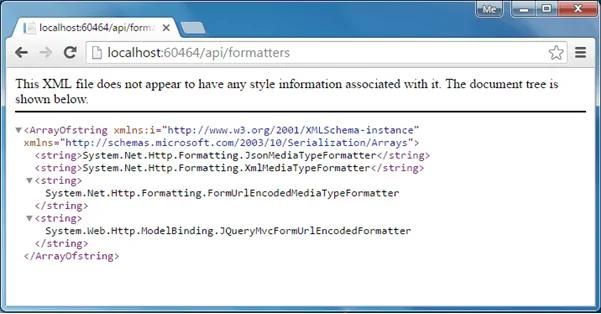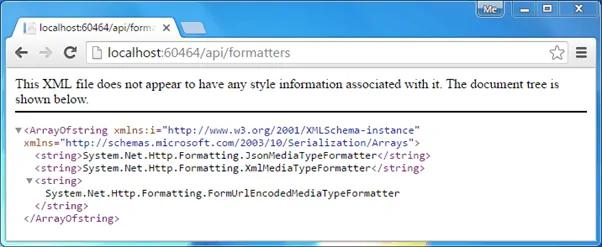ASP.NET Web API: Media-Type Formatters
As you have seen in the previous section that Web API handles JSON and XML formats based on Accept and Content-Type headers. But, how does it handle these different formats? The answer is: By using Media-Type formatters.
Media type formatters are classes responsible for serializing request/response data so that Web API can understand the request data format and send data in the format which client expects.
Web API includes following built-in media type formatters.
| Media Type Formatter Class | MIME Type | Description |
|---|---|---|
| JsonMediaTypeFormatter | application/json, text/json | Handles JSON format |
| XmlMediaTypeFormatter | application/xml, text/json | Handles XML format |
| FormUrlEncodedMediaTypeFormatter | application/x-www-form-urlencoded | Handles HTML form URL-encoded data |
| JQueryMvcFormUrlEncodedFormatter | application/x-www-form-urlencoded | Handles model-bound HTML form URL-encoded data |
Retrieve Built-in Media Type Formatters
As mentioned Web API includes above listed media type formatter classes by default. However, you can also add, remove or change the order of formatters.
The following example demonstrates HTTP Get method that returns all built-in formatter classes.
public class FormattersController : ApiController
{
public IEnumerable<string> Get()
{
IList<string> formatters = new List<string>();
foreach (var item in GlobalConfiguration.Configuration.Formatters)
{
formatters.Add(item.ToString());
}
return formatters.AsEnumerable<string>();
}
}In the above example, GlobalConfiguration.Configuration.Formatters returns MediaTypeFormatterCollection that includes all the formatter classes. The above example returns names of all the formatter classes as shown below.

Alternatively, MediaTypeFormatterCollection class defines convenience properties that provide direct access to three of the four built-in media type formatters. The following example demonstrates retrieving media type formatters using MediaTypeFormatterCollection's properties.
public class FormattersController : ApiController
{
public IEnumerable<string> Get()
{
IList<string> formatters = new List<string>();
formatters.Add(GlobalConfiguration.Configuration.Formatters.JsonFormatter.GetType().FullName);
formatters.Add(GlobalConfiguration.Configuration.Formatters.XmlFormatter.GetType().FullName);
formatters.Add(GlobalConfiguration.Configuration.Formatters.FormUrlEncodedFormatter.GetType().FullName);
return formatters.AsEnumerable<string>();
}
}The above example returns following response to the browser.

BSON Formatter
Web API also supports BSON format. As the name suggests, BSON is binary JSON, it is a binary-encoded serialization of JSON-like documents. Currently there is very little support for BSON and no JavaScript implementation is available for clients running in browsers. This means that it is not possible to retrieve and automatically parse BSON data to JavaScript objects.
Web API includes built-in formatter class BsonMediaTypeFormatter for BSON but it is disabled by default. Learn more about BSON support in Web API here.
JSON Formatter
As mentioned above, Web API includes JsonMediaTypeFormatter class that handles JSON format. The JsonMediaTypeFormatter converts JSON data in an HTTP request into CLR objects (object in C# or VB.NET) and also converts CLR objects into JSON format that is embeded within HTTP response.
Internally, JsonMediaTypeFormatter uses third-party open source library called Json.NET to perform serialization.
Configure JSON Serialization
JSON formatter can be configured in WebApiConfig class. The JsonMediaTypeFormatter class includes various properties and methods using which you can customize JSON serialization. For example, Web API writes JSON property names with PascalCase by default. To write JSON property names with camelCase, set the CamelCasePropertyNamesContractResolver on the serializer settings as shown below.
public static class WebApiConfig
{
public static void Register(HttpConfiguration config)
{
config.MapHttpAttributeRoutes();
config.Routes.MapHttpRoute(
name: "DefaultApi",
routeTemplate: "api/{controller}/{id}",
defaults: new { id = RouteParameter.Optional }
);
// configure json formatter
JsonMediaTypeFormatter jsonFormatter = config.Formatters.JsonFormatter;
jsonFormatter.SerializerSettings.ContractResolver = new CamelCasePropertyNamesContractResolver();
}
}XML Formatter
The XmlMediaTypeFormatter class is responsible for serializing model objects into XML data. It uses System.Runtime.DataContractSerializer class to generate XML data.
Learn more about configuring JSON and XML serialization here.